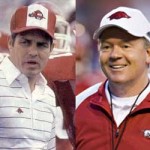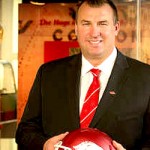
Some Arkansas Razorback fans, especially the many younger ones, may only see what follows as a football version of Six Degrees Of Kevin Bacon. You know: somewhere nearly ever actor in the movie business has worked with Kevin Bacon.
But the coaching family from which new Hog coach Bret Bielema has sprung does matter. If you traced coaching genealogy enough, you’ll find that not only does Bielema’s Hayden Fry background stretch back to Frank Broyles, who put Arkansas football annually on the national map in the 1960s, but it also continues on to Gen. Robert Neyland, who from his base in Knoxville, Tenn., scattered great coaches with winning principles into the Southern wind back in his day.
When I was a kid, the Gen. Neyland Family Tree of coaches mattered to people who knew and understood college football. It directly touched Arkansas Razorback football first with the arrival in 1946 of John Barnhill, who would lead a renaissance of sorts for the university’s football program. “Barney” played and learned under Neyland at Tennessee, subbed for Neyland with the Vols as head coach when the general went off to WWII, and then came to Arkansas when the general returned to Knoxville to resume coaching.
Barnhill only lasted four years as a head coach before illness forced him to fall back into the athletic director’s role for the next decade-and-a-half. After an ill-fated experience with an NFL assistant coach, Otis Douglas, to begin the 1950s, “Barney” summoned another Neyland protégé, former Vol Bowden Wyatt, from Wyoming, and Wyatt led Arkansas to its first wire service Top Ten ranking before returning home after two years to Tennessee to succeed the general as head coach.
Frank Broyles didn’t play for Neyland, but he did star at Georgia Tech for Bobby Dodd, who was yet another Neyland player/protege. Broyles, regarded as an offensive innovator for Dodd on the Tech staff when the Yellowjackets were among the dominant programs of the 1950s, still had to prove himself for a year as a head coach at Missouri before Barnhill would give him the reins at Arkansas in 1958.
Razorback fans of today, the younger ones, don’t realize that the football they’ve come to passionately support over these recent years started in earnest with Broyles from 1959 through the infamous “Big Shootout” with Texas in 1969. (I understand their sentiments; when I began to realize just who the Razorbacks were in the mid-1960s, Arkansas football played in 1930s and earlier might as well have been from the Middle Ages, it was that foreign. It was only through Orville Henry’s reminiscing that we young Hog fans would learn anything of college football before facemasks and that Razorback games with Texas in Quigley Stadium drew lesser crowds than Pine Bluff and Little Rock High would attract.)
Broyles made Arkansas a destination for top national assistant coaches (hence the Broyles Award that’s now presented to the country’s leading assistant coach) during his head coaching career. These coaches came to realize that a few years with Broyles, even at little ol’ Arkansas, led directly to prime head coaching jobs. The irony was that Broyles believed that HIS hiring of a head coach required prior head coaching experience, but he was never reluctant to suggest one of this top coordinators for a head coaching job at some of the more traditional powers in college football.
Can you imagine today Oklahoma hiring its head coach directly off an Arkansas staff? Can you see Tennessee tapping a Hog assistant for the current Vols’ opening? Virginia Tech? Vanderbilt? Iowa State? SMU? Clemson? N.C. State?
Well, those programs did just that when Broyles was in charge.
Hayden Fry left Broyles and took over a horrid situation at SMU in 1964, but by 1966 Fry won the SWC and by 1968 had the Mustangs contending for the Top Ten and playing a wide-open brand of football. When he failed to deliver to anxious Mustang fans another Southwest Conference championship, though, he moved on to build the North Texas program before landing in Iowa, where he achieved his greatest fame.
At Iowa, Fry would coach a walk-on from Prophetsville, IIl., name Bret Bielema, who would impress the staff enough to start for the Hawkeyes as a redshirt freshman in the defensive line.
During the 1990s and into this new century, it became obvious to people who seriously followed football that a new, impressive coaching tree had taken root where the old Neyland family tree of coaches had existed. And it was growing out of Iowa City, Iowa.
Bill Snyder, Bob Stoops and his brothers, Barry Alvarez, Dan McCarney, Kirk Ferentz and others were moving on from Fry’s staff to enjoy great success elsewhere (or, in Ferentz’ case, he returned to Iowa City where he won big early and eventually landed what was likely the first 10-year contract bestowed on a head coach). The tree continued on with assistants who became successful head coaches such as Jim Leavitt and Bo Pelini, and extends to Mark Mangino, who worked for Snyder. Another Fry disciple is Tuesday’s Broyles Award winner, Notre Dame defensive coordinator Bob Diaco. Oklahoma co-offensive coordinator Jay Norvell is also in that mix.
And, of course, Bret Bielema.
With Gen. Neyland, his Seven Maxims of winning football were passed along to his protégés. And if they didn’t necessarily play or serve under Neyland, the coaches who followed at Tennessee after Bowden Wyatt — Doug Dickey, Bill Battle, Johnny Majors, Phil Fulmer — all knew and preached those maxims. Fulmer won UT’s first national championship since Neyland’s in 1951 with the 1998 title.
Tennessee broke the chain when its previous athletic administration sought out Lane Kiffin as head coach in 2008. The Vols program has been in disarray ever since.
This is not to say that the Neyland way, or the Hayden Fry way, is the only way to coach football. Bobby Petrino, who led Arkansas to heights not imagined in more than 20 years, came out of the respected, wide-open style of the Jim Sweeney coaching tree from the West Coast.
It’s also not to say that if we looked hard enough, a given coach who may bounce around at a lot of stops in a short period — Petrino and current Auburn coach Gus Malzahn come immediately to mind — surely encountered the Neyland, Fry or Sweeney coaching trees somewhere along the way.
The ones who absorbed all of what mattered in winning, from working with Neyland or his protégés, or Fry and the people he trained with similar coaching maxims, have proven to be the most successful over the years in college football. Those maxims including the basics or tackling and blocking the best and committing the fewest turnovers.
Arkansas has found itself in the middle of those coaching trees in a big and successful way throughout its football history. And on Wednesday, when the introduction of Bret Bielema, it had come full circle.
I was asked during various media appearances Tuesday and Wednesday what I thought Bielema’s first order of business should be. I said personally trying to lock down Pulaski Academy star Hunter Henry and perhaps offering enough words of encouragement to North Little Rock’s Altee Tenpenny to consider flipping from Alabama would be a great start. Turns out, he was way ahead of everybody on that, as reports suggest with Henry.
But I might also suggest Bielema take a few minutes somewhere in the busy next two months before National Signing Day to sit and talk football with Frank Broyles, who happens to be right in the middle of those famed coaching trees — a Neyland disciple through Bobby Dodd as well as a mentor of Hayden Fry.
Sure enough, the daily newspaper on Thursday morning featured Bielema giving Broyles a hearty handshake after his introduction on Wednesday.
The circle beginning with John Barnhill way back in 1946 and carried on by Broyles has been restored.
Email Jim here. Also follow Jim on Twitter.












